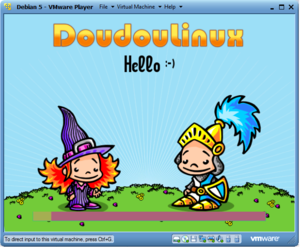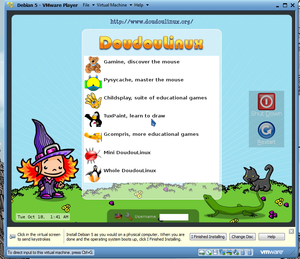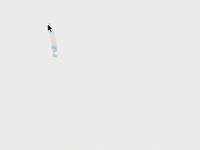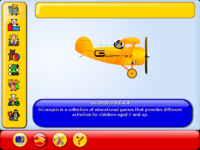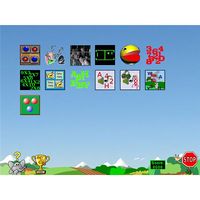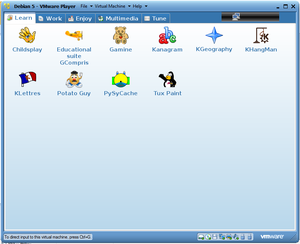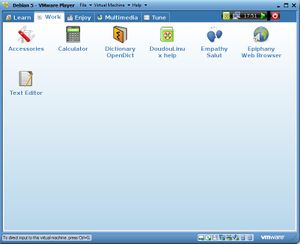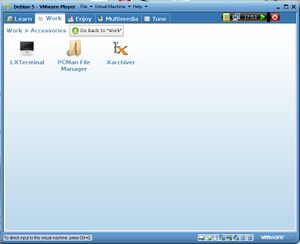COMP 3000 2011 Report: DoudouLinux
Part 1
Background
Doudou” is a french word for the teddy bear or blanket that children love to carry around and hug. In that context,DoudouLinux is a GNU/Linux distribution designed for young children from age two to seven.<ref name = "DoudouLinux: You know, for kids">Linux info from the source (Last accessed October 17, 2011).</ref>
It is a system that aims at making computer use as easy and pleasant as possible for children. Founded by the French Jean-Michel Philippe,its first release “Gondwana” was released in June 2011 and is based on a minimal Debian “Lenny” linux system.
DoudouLinux is officially available in 25 languages<ref name = "DistroWatch">DistroWatch (Last accessed October 17, 2011).</ref> and can be downloaded it on the DoudouLinux homepage as an ISO image file of approximately 693 MB in size.
Installation/Startup
Installation
The minimum requirements to run DoudouLinux are:<ref name = "Requierements">Downloads (Last accessed October 18, 2011).</ref>
- 256 MB memory
- 800 MHz processor
- 800×600 dots display
I used VMWare Workstation and allocated 8GB for the virtual machine and 512MB of RAM.
The installation is fairly easy and fast(around 30 seconds)[Figure 1]
No problems were encountered since there is minimal system configuration or management options and the system does not request setting up a username and password.
Startup
At boot time,there is an "Activities Menu" displayed that offers seven session options: [Figure 2]
- Gamine
- Pysycache
- Childsplay
- TuxPaint
- GCompris
- Mini DoudouLinux
- Whole DoudouLinux
The first five options are single applications sessions while Mini DoudouLinux is a session with a reduced set of applications offered.
The Whole DoudouLinux option was choosen.
Basic Operation
As shown in the activities menu(Figure 2) the applications are ordered by increasing difficulty.From the two year old child who discovers the mouse and the keyboard(Gamine and Pysycache) to more experienced users with educational suites such as Childsplay and GCompris.
In the Whole DoudouLinux session,close to fifty applications are offered and they are grouped in categories,by type(i.e Work,Learn,Enjoy) that have their own tab in DoudouLinux application Launcher.[Figure 4]
The general games category includes standard puzzle and non-violent arcade fare, plus some common card and board games.
Hours were spent playing the games from the Enjoy category.
.
Usage Evaluation
The DoudouLinux design goals are, in my view, met and exceeded.The system runs fast since there is less configuration to do.The icons are very colorful,suggestive and large enough for children.
Depending on the age of the child,the mouse speed can be easily adjusted as well as the sound output.
In some applications,hovering the mouse on an item provides sound instruction.
The system contain plenty of interactive and tactile-experice tools that respond to single-clicks for better ease-of-use. Since window management would,presumably, be tricky with young children,all the applications or game run in full-screen mode.
.
Part 2
Software Packaging
Packaging Format and Utilities
As Doudoulinux is Debian based,It uses the same package format.deb with the main Debian package management program, dpkg. Since DoudouLinux is based on a minimal Debian “Lenny” Linux system and is geared toward childrens,there is no need for the higher level package management tools such as aptitude or the graphical package manager Synaptic.However,the Advanced Packaging Tool (APT) that relies on dpkg, is installed as well as the utilities for manipulating .deb files: dpkg-deb and dpkg-split.
Listing Installed Packages
As mentioned above,there are no graphical package manager,such as Synaptic, installed so the only way to get a list of the installed packages is through the terminal.Accessing the terminal isn't obvious since DoudouLinux tries to hide that aspect from children.One has to go to the "Work" tab [Figure 5]and then the "Accessories" tab[Figure 6]. From the command line, you get the list of the packages by typing "dpkg --list".
Adding and Removing Packages
DoudouLinux does not have many packages(~913 packages) compared to other Debian based distributions.The installed packages are those that are required and necessary for the proper functioning of the system.The larger applications present, such as Gamine, are installed for their educational and entertaining value to children.As such there is no Office suite since it is not indispensable for children.
<ref name = "DoudouLinux User Manual ">DoudouLinux User manual (Last accessed November 12, 2011).</ref>
However,a package can be installed,when in superuser, using 'dpkg --install <packageName>.deb' where the packageName is a file in your current working directory. They can be removed by using 'sudo dpkg --remove <packageName>' ,which will leave the package's configuration file, or 'dpkg --purge <packageName>',which will remove the package's configuration file as well.
This method is somewhat inconvenient for adding packages since they must first be downloaded.
A better method is using APT which expands the functionality of dpkg by searching, fetching and installing packages from online repositories along with their dependencies, either from binary files or by compiling source code.<ref name = "Advanced Packaging Tool ">Advanced Packaging Tool (Last accessed November 11, 2011).</ref>
So,in the terminal, typing 'sudo apt-get install <packageName>' will install a particular package along with all of its dependencies, while 'apt-get remove <packageName>' will remove the package<ref name = "The Debian Package Management Tools ">The Debian Package Management Tools (Last accessed November 13, 2011).</ref>
Software Catalog
As mentioned above,DoudouLinux does not have an extensive list of packages that are installed.
Major package versions
Here are the version numbers and upstream sources of various major software packages included in DoudouLinux as part of the standard install, and packages that are central to the system. Notable inclusion in this list are the major applications such as Gamine and Childsplay.
| Package | Version | Upstream Source |
|---|---|---|
| Linux Kernel | 2.6.26-2-686 | http://www.kernel.org/ |
| libc | 2.7-18lenny7 | http://www.gnu.org/s/libc/ |
| X.org X Server | 7.3+20 | http://www.x.org/wiki/ (Debian-specific version: http://wiki.debian.org/XStrikeForce) |
| GTK+ | 2.12.12-1 | http://www.gtk.org/ |
| Qt 4 | 4.4.3-1+lenny1 | http://qt.nokia.com/ |
| Bash(The GNU Bourne Again SHell) | 3.2-4 | http://www.gnu.org/software/bash/ |
| Dash (Debian Almquist Shell) | 0.5.5.1-7.4 | http://gondor.apana.org.au/~herbert/dash/ |
| Coreutils (GNU core utilities) | 8.5.1 | http://www.gnu.org/s/coreutils/ |
| Busybox | 1.17.1-8 | http://busybox.net/ |
| Chromium | 9.0.597.45~r70550-1 | http://dev.chromium.org/Home |
| Crunchbang-Dropbox64 | 1.0.10-1 | http://openbox.org/ |
| Openbox | 3.4.11.1-1 | http://openbox.org/ |
| Xfce4 | 4.6.2 | http://www.xfce.org/ |
| Conky | 1.8.0-1+squeeze1 | http://conky.sourceforge.net/ |
| Thunar | 1.0.2-1+b1 | http://thunar.xfce.org/ |
Initialization
Part 3
Comin soon to a Wiki close to you....
References
<references />
